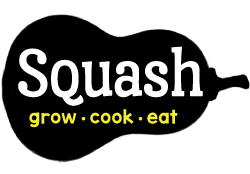A lot of people tried growing food for the first time in the last few years. Buying garden seed can feel complicated compared to other purchases. I’m here to help with a series of 18 seed company profiles. I have fairly deep knowledge of the seed industry and considered more than 90 companies in order to highlight these 18 for you.
This is the last in a series of three posts. Today’s content includes one long profile of Fedco Seeds, which I know very well as a customer, and five shorter profiles of companies I don’t know well except by reputation and research. In case you’re landing here first, I’ll start with an index of the past two posts and the company links therein.
Post 1: Johnny’s, Kitazawa, Native Seeds, Rupp Seeds, Seeds from Italy, Southern Exposure- Johnny’s Selected Seeds
- Kitazawa Seed Co.
- Native Seeds/SEARCH
- Rupp Seeds
- Seeds from Italy
- Southern Exposure Seed Exchange
- Two Seeds in a Pod
- A.P. Whaley Seed Company
- Stokes Seeds
- The Plant Good Seed Company
- High Mowing Organic Seeds
- Twilley Seeds
Today’s Garden Seed Company List (Post 3)
Note: prices mentioned on this page were correct at the time of posting, winter 2020/21. If you are browsing here in a later year — Hello future people! — the prices will have changed, of course. Happy shopping!
Be Loyal AND Curious
Some of you might have a garden seed company to whom you’ve been loyal for years. Certainly, stick with them if you are happy! Loyalty is the lifeblood of independent seed companies. I teased last time that in my first 12 profiles I hadn’t yet covered the company I order from most, and it is in fact the one I’ve been ordering from the longest, and my loyalty is strong. Without further ado, here are today’s six selections, starting with my old favorite, Fedco.
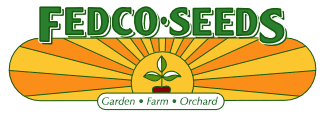
Fedco Seeds
Fedco Seeds is a Maine-based cooperative seed company, 60% owned by customers and 40% by worker-owners. The focus is on garden seed for northern climates, but a broad range is offered and I find most of what I need for my North Carolina garden from Fedco. There are separate catalogs and a separate order form for trees/plants, roots and bulbs, and supplies.
Fedco is incredibly dedicated to supply chain transparency. “We think you should know as much as possible about our seed,” they say, and this principle is followed. So, if you are a person who likes to “vote with your wallet” for the type of business or agricultural practices you most believe in, Fedco tells you what you need to know. Every item in the catalog is marked with a where your seed comes from code numbered 1-6. These codes are described as follows on Fedco’s site and in catalog:
① Small seed farmers including Fedco staff.
② Family-owned companies or cooperatives, domestic and foreign.
③ Domestic and foreign corporations not part of a larger conglomerate.
④ Multinationals not to our knowledge engaged in genetic engineering.
⑤ Multinationals who are engaged in genetic engineering.
⑥ Syngenta, manufacturer of neonicotinoids.
Fedco does not buy seed from Monsanto (now Bayer) vegetable seed subsidiaries. When Monsanto bought out vegetable seed industry giant Seminis for a billion+ dollars in 2005, Fedco made huge changes to their catalog to phase out all Seminis varieties, but only after polling customers and receiving more than a thousand responses. They were hardly unanimous but there was a strong preference, which Fedco honored.
At the same time, Fedco is practical and wants to meet the needs of its farmer and consumer customers. So, while they prioritize sourcing from their network of smaller companies and producers, they also strive to fill every vegetable type and niche with the most effective and affordable variety they can. Pricing is excellent, with quite a few items under $2 at the smallest packet size and a huge range of packet sizes available, all priced fairly. As always, hybrids are more expensive, and some items add cost to deliver more of the profit back to the breeder or to the indigenous communities who played a large role in developing the breeding line.
You know by now that I love seed companies and catalogs, but Fedco’s black-ink-only newsprint catalog is the only one I read cover to cover annually. It’s informative, in-depth, and hilarious. There’s a sort of random free-range humor that perhaps reveals the boredom of some lonely soul having to describe far too many catalog items. Yesterday I noticed for the first time this description of Samson brand garden gloves: “Whether you need to kill a lion with your hands, massacre a thousand Philistines with an ass’s jawbone, or dig turnips out of half-frozen mud in late October, regular garden gloves just won’t cut it anymore.” It goes on from there to describe the gloves and even quotes a satisfied customer.
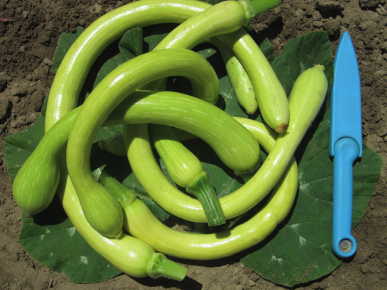
Fedco’s squash selection is not huge but has everything you need. It’s a little stronger for summer squash, with 10+ zucchinis and 6 yellow squashes, plus patty pans and such. This is likely due to the northern focus. There are a lot of great winter squashes that may not mature well in the shortest seasons, and the catalog does offer a few of these, while designating them clearly.
Winter squashes cover the range with smart selections. Here as throughout the catalog, Fedco explains exactly why they chose for you the one variety they did in a particular niche. Why is ‘Little Dipper’ the one hybrid butternut offered? Fedco explains. Honesty and directness always reign: in the listing of a more expensive hybrid buttercup squash, Thunder, the reasons for growing it are given, then a staff member is quoted declaring that she prefers the much cheaper standard buttercup, ‘Burgess. ‘
Summary: Choose Fedco Seeds for their smart, honest, funny catalog, very fair prices, and focus on northern-adapted varieties. I have 15 years of experience with their seed quality and have never been disappointed.

Adaptive Seeds
Adaptive Seeds is a small operation with big ideals, put into practice with a commitment to quality and success. I don’t have much direct experience but their reputation is solid. In business from their Oregon farm-based offices for more than ten years now, Adaptive Seeds displays a lot of strong commitments: garden seeds are 100% grown in the Pacific Northwest by a grower network; 100% organic; 100% untreated; 100% open-pollinated. They include both rare/heirloom and modern varieties.
Pacific Northwest suitability is important to Adaptive Seeds. Looking through their squash selection as an example, there are several varieties they collected on trips to northern Europe, which has a similar climate in terms of day length and temperatures. I haven’t seen these fairly obscure types in most other catalogs. Enticing selections include:
- ‘Doran Round,’ a pumpkin-shaped butternut variety from The Netherlands;
- ‘Rheinau Gold,’ a lovely-looking yellow-gold zucchini of Swiss origin; and
- ‘Sonca Orange,’ another butternut sold commercially in Hungary.
Adaptive Seeds also offers some seed as gene pools, or ‘land races’ as I’ve heard them called. Typically this is a range of genetics (shapes, colors, growing habits) with some desirable features held steady in the mix. An example is Adaptive’s ‘Butternut Early Remix.’ Click and read to understand how a grower develops a diverse gene pool like this one. I wish more companies sold mixes like this and more breeders worked to refine and offer gene pools, as creative and revered plantsman Frank Morton does. Planting diverse rather than uniform genetics from one packet is tricky for commercial farmers, but it brings resilience AND fun to our home gardens.
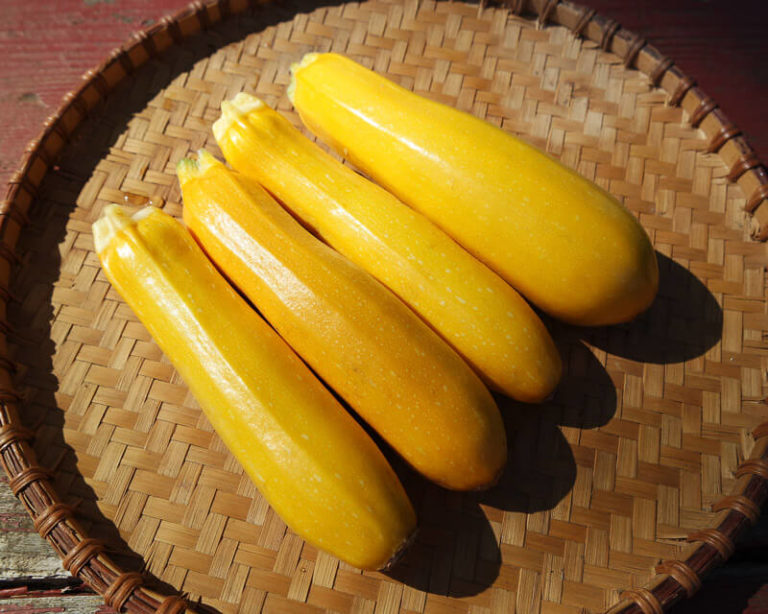
Prices are quite fair for organic certified, small farm-grown seed: home garden seed packets sell for around $3.80, and a range of larger sizes is provided for organic farmers and homesteaders who need more seed.
Summary: Choose Adaptive Seeds to ensure seed suited for a Pacific Northwest climate (or similar), to access some interesting varieties, and/or to support farm-based garden seed production as directly as possible.

Territorial Seed Company
Based in Cottage Grove, Oregon, Territorial Seed Company is another regional seedhouse focused on adaptability in the Pacific Northwest, but with passionate customers all over the continent.
In business since 1995, Territorial is larger, perhaps more in Johnny’s sales size range than Fedco, but also farm-based and independently owned. Territorial’s catalog, like the two just referenced, offers a wonderful range of products: garden seed for vegetables, herbs, flowers; landscape plants, fruits, and vines; growers’ supplies, tools, books, and gifts.
With all this offered, the website is one of the most super user interface experiences among seed companies. For example, out of stock items can be filtered out of any item list. Sounds simple, but almost nobody else does this. I’ll spare you any further point-by-point analysis, but trust me: Territorial offers multiple thoughtful improvements in relation to the seed shopping experience elsewhere. It works.
From its founding, Territorial has held a special interest in year-round gardening. Their entire online catalog can sort into fall and winter garden seed selections via a designated link. For more than half of the US, and even in the far north with more effort, growing vegetables in fall and winter is under-practiced. For me the issue is fatigue, I’ve worked too hard in spring and summer and I’m just sick of it all. But boy would it be smart and rewarding to stop trying to grow cold-hardy crops into summer when they face the most pest pressure and water need, and transfer some of that work into the colder months.
Let’s take a look at Territorial’s squash seed selection as a barometer of their selection and pricing.
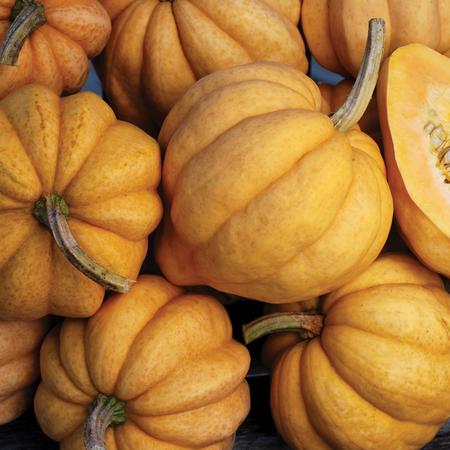
- Some organic and heirloom options, like the Slow Food Ark of Taste-honored variety ‘Thelma Sanders Sweet Potato‘ squash.
- A small but thoughtful offering of hybrids, including the punnily-named Steph Kuri.
- Best pricing (under $3 vs. $4-$7 for most items) on standard mass-produced open-pollinated varieties like yellow crookneck and dark green zucchini.
I have minimal personal experience with Territorial. A former Board member of my past employer (seedprograms.org) consults with Territorial, and he’s a super-sharp knowledgeable guy when it comes to understanding the complete global picture for vegetable garden seed. So that connection alone informs my vote of confidence.
Summary: Choose Territorial if you are striving to achieve 12-month garden harvests, are located in the Pacific Northwest, and/or appreciate a well-made website offering one-stop shopping for all your garden needs.

Jordan Seeds
Jordan Seeds is a small company that very few readers are aware of. I got to know Jordan Seeds when ordering very affordable bulk garden seed for international hunger response in my non-profit work. I always found their customer service to be top-notch. The company is located in Woodbury, Minnesota. This is just east of St. Paul and is the type of spot that was once farmland to every horizon but now sits between a Costco and a Target.
Jordan Seeds likely grows little or none of their inventory. They are a trusted regional supplier to farmers and gardeners, distributing seed that they source from others. There is one organic certified seed item in the entire catalog.
Why do I include Jordan Seeds? If you have a big garden, small farm, or are ordering for your neighborhood, school, or place of worship, this is a great, affordable choice with every kind of garden seed you need. Check out these prices:
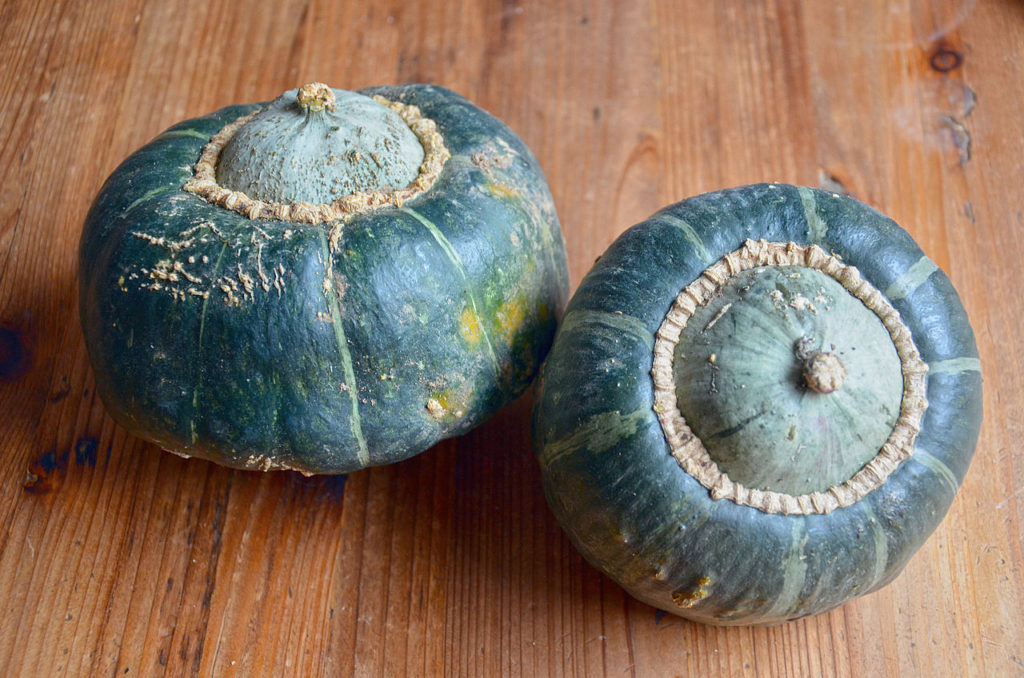
- A quarter pound of lettuce seed for $3 and up.
- A pound of pea seed for $3 and up.
- A half ounce of tomato seed for $3-$5+.
- A quarter pound (about 1,000 seeds) of hybrid squash runs around $30 on average, and open-pollinated squashes are about $5 per quarter pound. All told, there are a few dozen squash varieties on offer.
If you’re unfamiliar with packet sizes, the above weights might not sound big, but they are! Items like lettuce and tomato are usually weighed in grams, not pounds, or by seed count. Whereas a packet of tomato would typically contain 20-200 seeds, varying by company, the half ounce referenced above is, conservatively, 3,000 tomato seeds. And it costs less than many packets that contain 1% of that volume!
The selection at Jordan Seeds is not too narrow. You’ll find a mix of hybrids and open-pollinated (including heirloom) varieties, some specialty flowers and herbs, and even some Asian vegetables. As expected, the cheapest items are those most common in the seed trade.
Summary: Choose Jordan Seeds to access a little-known value seller of bulk quantities at packet prices.

Victory Seeds
I guess it’s Oregon day here on the blog, as here comes Oregon company #3 on the list: Victory Seeds.
The Victory Seed Company is another one with stellar reviews with which I have little personal experience, so I’ll keep my comments on the short side.
What’s unique about this company is the owners’ passion for history. Other reasons for preserving biodiversity (food supply security, flavor, etc.) are evident on the Victory site But a real love of the stories and heritage behind the crops and varieties shines through most of all. A 95-variety tobacco seed collection (!) appears with a history of tobacco. One site page showcases garden seed for plants catalogued by Lewis & Clark‘s expedition team. The cabbage page refers readers to two reference books—published in 1901 and 1912. The crown jewel of the history focus here is the sister website, saveseeds.org, home of the Victory Horticultural Library. Take a look! There are many wonderful reference materials, including lots of old seed catalogs to browse.
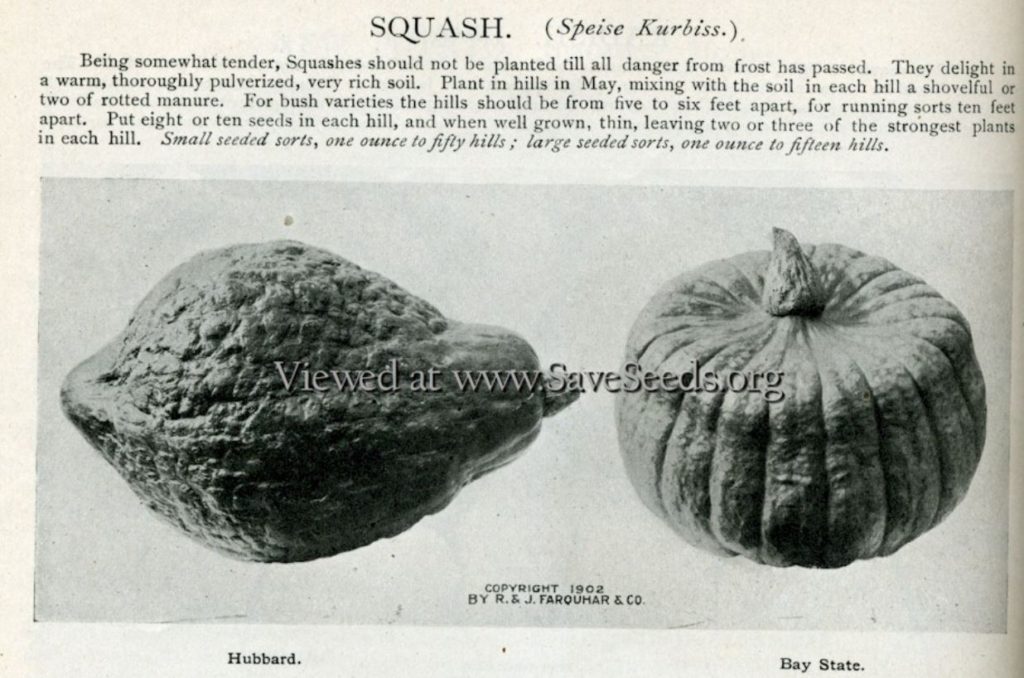
As for squash, you’ll find a solid collection of 27 winter squash varieties and 15 summer squashes, all open pollinated. Prices are low. Most items are $2.25 with a few exceptions. I’ve heard and seen only good reviews of customers’ experience with the seed quality and customer service.
Summary: Victory Seeds is dedicated to horticultural history and also offers a collection that is very fairly priced and for some items quite unique.

Seed Savers Exchange
Seed Savers Exchange is one of the organizations responsible for my passion for learning all I can about vegetable varieties. My history with SSE goes back two or three decades to before SSE offered a glossy catalog for the public to order seeds. Instead, their primary means of fostering seed preservation was as a massive, person-to-person global seed-trading association of sorts. Anybody could join and list garden seed they had saved. Then, you could send a little money to request seed from others, having made a pledge to attempt to save and share it in turn. This seed was listed in a thick yearbook, the size of a small city’s yellow pages (remember those)? Seed would arrive all sorts of ways, often in a dusty repurposed envelope, hand-addressed. Some of the people now running seed companies listed in these posts were sharing seed via SSE back then. Some still do.
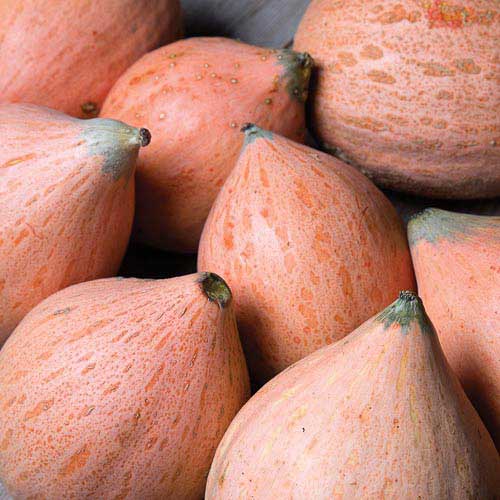
Seed Savers Exchange now offers a beautiful catalog, printed and online, so you can buy heirloom seed whether or not you are able to share it. If you do want to join the Seed Savers Exchange, everything I described above still exists, and has only grown stronger.
Check out the sister site, exchange.seedsavers.org, and wham! you’ve got a new hobby. You can still request the great big Yearbook that lists all the members’ seed. There are 476 squashes. This is the motherlode of seed diversity. It’s the source of many of the heirloom varieties listed by the prior 15 companies I’ve talked about in these posts.
If you’re into garden seed, SSE offers a super-informative and entertaining blog. This graphic ranking squashes by storage value appeared in a 2014 post.
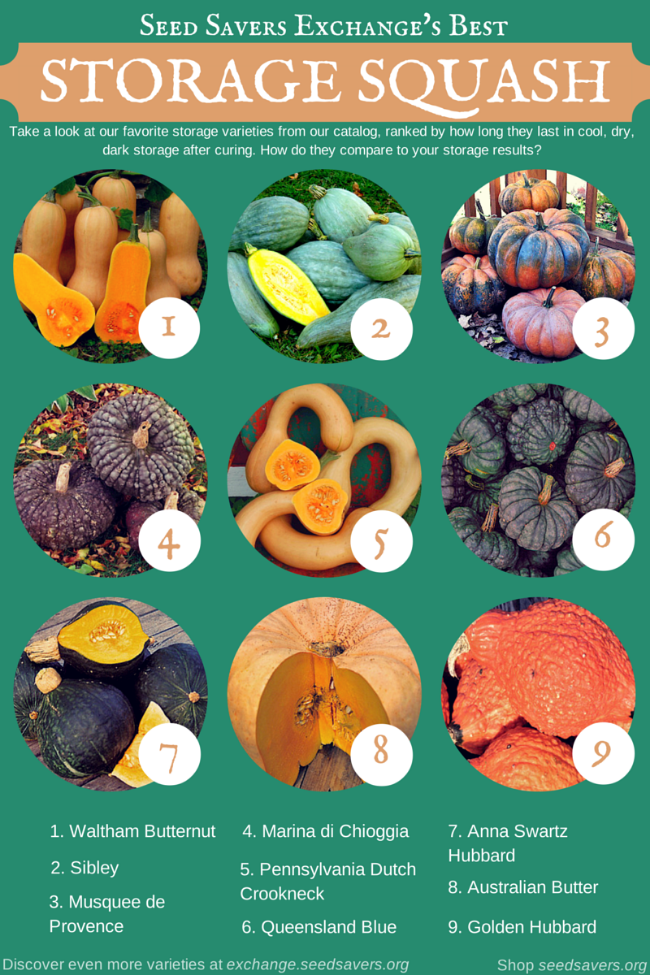
The squash collection at SSE is strong. As you’d expect, it’s focused on heirloom varieties, and always includes a few that the Exchange as pulled from the deep corners of the yearbook and multiplied for the world to try. Exciting stuff!
For 2021, I’m interested in the rarely-offered ‘Sweet Fall‘ variety. This is a C. maxima type that has the coloration of ‘Pink Banana’ or ‘North Georgia Candy Roaster,’ but in a more compact round package.
‘Dostal Cucumber‘ sure looks like somebody grew tired of overgrown zucchinis and decided to let them all grow into big winter squashes, then selected those that tasted sweet from the oven. It’s not offered in any other well-known seed catalog I could find.
Summary: Choose Seed Savers Exchange to support a great organization dedicated to seed preservation, while accessing some unique heirloom varieties. Join the exchange to trade seeds with new friends worldwide.
Thanks for joining me on this grand tour of 18 garden seed companies! Let me know what you learned, what you tried, and where you disagree. Happy Gardening!
